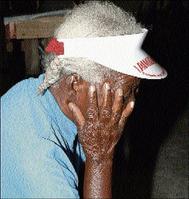Gareth Manning, Sunday Gleaner Reporter
The elderly comprise the fastest-growing cohort of Jamaica's population. - file
With Jamaicans 80-85 years old accounting for the fastest-growing segment of the population, several parents, particularly those in the lower socio-economic group, are left to fend for themselves.
This is happening despite the existence of laws that bind adult children to maintain their parents and grandparents.
Under Section 10 of the Maintenance Act of 2005, every adult has an obligation - as long as he is able to do so - to maintain his parents and grandparents if they are unable to do so themselves due to physical or mental infirmity. The law also applies to children who were cared for and nurtured by adults to whom they were not biologically related.
If the children fail to do so, the dependent parents or grandparents can take their adult children to court to secure maintenance.
not many cases
However, since the act was introduced, there have not been that many cases brought before the court. Only three have been heard by the Family Court in Kingston.
"Some of them (elderly) are destitute or don't usually have anybody around them. Some of them have children who are abroad or they don't know the whereabouts of their children," a practising attorney-at-law in the Kingston Family Court, Lance Rose, states.
"Also, most old people don't want to be a bother to their children," he adds.
He admits though, that not many people know about this aspect of the act and that is the likely reason for so few cases before the courts.
"If there is more public education about the act, more cases will come before the courts," he says.
Most of the cases so far have involved fathers who were not being maintained by their children.
"But there is a burning issue where the parent has never cared for the child, and that is why some children don't maintain their parents," Rose adds.
Lornawas one of those cases. She was abandoned by her mother as a child and left with strangers who raised her and her sisters. When her mother grew old and could no longer care for herself, she sued Lorna and her sisters for maintenance.
For Robert, the situation was similar. He was dragged before the court by his father, whom he barely knew. He refused to maintain his father, claiming his father had failed to maintain him during his formative years.
However, in both Lorna and Robert's cases, the court ordered that the children maintain their parents.
left on their own
Professor of Public Health and Ageing at the University of the West Indies, Denise Eldemire-Shearer, acknowledges that more of the nation's elderly are being left on their own as their children leave the nest and try to make their own lives. But she admits that while, ideally, children should maintain their parents when they are unable to do so themselves, enforcing stricter laws might not be the best way to go.
"There is the other issue you struggle with: How do you make a child who was abandoned or given to somebody else, who had no influence in the early formative years, whether emotionally or financially, look after somebody like that?" she argues.
Instead, she wants more emphasis to be placed on family values. She thinks having grandparents in the home would help nurture and strengthen families because of their wealth of experience and knowledge about life.
Adding to that, she believes most of the elderly, who are healthy and capable, can look after themselves if more community support were available.
"As a country, that is the group we are going to have to focus on. We are going to have develop the community programmes because those are people, in the main, that with a little bit of assistance, can stay in their own homes," she says.
Named changed.

